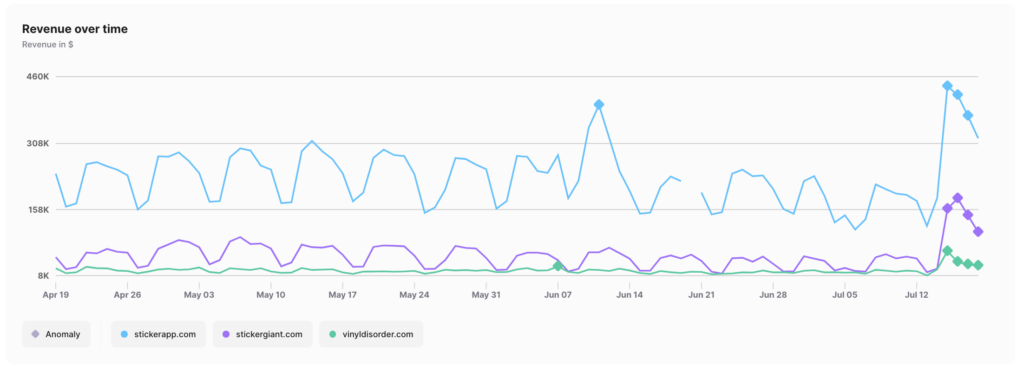In today’s polarized climate, brands are increasingly finding themselves navigating the tricky waters of political discourse. While some companies intentionally wade into political conversations to align with their core values or resonate with a specific audience, others inadvertently spark controversy, resulting in significant shifts in customer behavior. A recent example involving Sticker Mule exemplifies this phenomenon and its repercussions within the retail space.
Sticker Mule Trump Email Boosts Sales for Competitors
The Politicization of Retail: A Double-Edged Sword
Sticker Mule’s Political Shockwave
On July 15th, Anthony Constantino, co-founder of Sticker Mule, sent an email to the company’s client list expressing his support for former President Donald Trump. The email, which also included a promotional offer for a discounted shirt, triggered a strong reaction from customers.
The message read:
Donald Trump was shot.
I don’t care what your political views are but the hate for Trump and his supporters has gone too far.
People are terrified to admit they support Trump. I’ve been scared myself.
Americans shouldn’t live in fear.
I support Trump. Many at Sticker Mule do.
Many at Sticker Mule also support Biden.
The political hate needs to stop.
Hopefully this email helps.
Btw, this week, get 1 shirt for $4 (normally $19).
I suggest buying one that shows you support Trump.
The more people realize that millions of kind-hearted, compassionate people support Trump, the sooner the hate will end.
Awesome people, all over the world, love Trump. Don’t limit your friendships and diminish your happiness by indulging in political hate.
Vocalize your support. Stop the hate.
Anthony Constantino
Cofounder, Sticker Mule
P.S. Discuss this message on X
The overt political endorsement, particularly for such a polarizing figure, did not sit well with many of Sticker Mule’s customers, prompting a swift backlash. Disgruntled clients began seeking alternative suppliers, leading to a notable surge in sales for Sticker Mule’s competitors.
Competitors Capitalize on Controversy
As customers looked for other options, companies like Sticker Giant, Sticker App and Vinyl Disorder experienced significant boosts in their online sales. According to Grips, between June 16th and 18th, StickerGiant.com reported a 219% increase in sales compared to the previous week, marking their best three days of the year. Sticker App saw sales online double over the same period, with June 15th ranking as their best day in over a year. And VinylDisorder.com sales jumped 138% from the 15th through the 17th compared to the week prior and the 15th was their top performing day of the last year by a wide margin.

Daily sales on stickerapp.com, stickergiant.com and vinyldisorder.com
This swift response highlights how quickly consumer loyalty can shift in reaction to a brand’s political stance. In the digital age, where news spreads rapidly across social media platforms, businesses must carefully consider the potential fallout from politically charged communications.
Tractor Supply Co.: Another Case Study
Sticker Mule’s incident is not an isolated case. The retail industry has seen similar scenarios where political or social statements by companies lead to notable shifts in consumer behavior. Take Tractor Supply Company, for example. In June, they made headlines after after announcing significant changes to its diversity initiatives and climate goals in response to right-wing pressure.
As detailed in our previous analysis, Tractor Supply’s strategic decisions and public announcement resulted in a one-day spike in sales followed by more than two weeks of declines as well as an overall drop in market share, illustrating the power and risks of corporate communications in the political and social arena.
The Fine Line of Brand Politics
The politicization of retail is a double-edged sword. On one hand, taking a political stance can strengthen brand loyalty among like-minded consumers and differentiate a company in a crowded market. On the other hand, it risks alienating a portion of the customer base, leading to potential revenue loss and reputation damage.
For companies navigating this landscape, the key lies in understanding their audience and aligning political statements with their core values and long-term brand strategy. Transparency, authenticity, and sensitivity are crucial in managing the risks associated with politicized communications.
As the Sticker Mule case demonstrates, the impact of political statements extends beyond immediate customer reactions—it can significantly influence market dynamics and competitors’ performance. Brands must weigh the potential benefits against the risks to navigate the politicized retail environment successfully.
